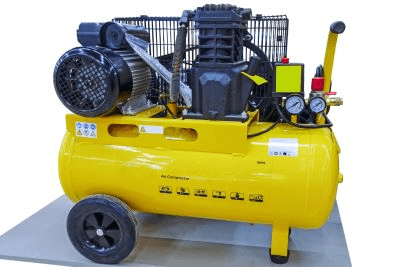What Is an Air Compressor?

An air compressor is a machine that compresses air to a high pressure.
Also called a compressor, it sucks in air, pressurizes it with pistons, rotors, and other parts, and stores it in a tank or sends it out through a hose or pipe. Air compressors are used in a variety of fields, including industry, construction, and medicine.
The pressure and volume of air used vary with each application, and various types of air compressors produce compressed air depending on the conditions. Generally, the type and size (equipment size and output) of the appropriate air compressor is determined by the air volume and discharge pressure (air pressure).
Uses of Air Compressors
Air compressors are used to pressurize air and can be used for a variety of applications.
1. Civil Engineering and Construction
Air compressors are used to power air tools such as drills, hammers, and wrenches. They are lighter, smaller, more powerful, and safer than electric tools because they do not generate sparks or heat.
2. Painting Field
Compressed air is also used in airbrushes and spray guns to apply paint evenly to surfaces such as automobiles and furniture. Air compressors are used as a source of this compressed air.
3. Industrial Fields
Compressed air is also used in automatic control valves. In this case, a digital regulation electrical signal from a control device such as a DCS or PLC is converted into an air pressure signal according to its output, and the air pressure is often used as the regulation volume.
4. Other
This is used for cleaning by blowing dust and debris away using high-pressure air delivered from an air compressor. It can remove dirt from electronic components, machinery, and other small parts.
It is also useful when using high-pressure air delivered from an air compressor to lower the temperature. The rapid expansion of air causes a decrease in temperature. This principle is used to cool food, medicine, and other products. A typical example is an air chiller for cooling.
Principle of Air Compressors
Air compressors operate based on the Boyle-Charles law. Boyle-Charles’ law is the law that volume and pressure are inversely proportional if the temperature of a certain amount of gas is constant.
In other words, the smaller the volume, the greater the pressure. Air compressors use this law to create high-pressure air and supply it where it is needed in the following sequence
1. Suction
Air compressor sucks ambient air. As the air is sucked, it is filtered to remove foreign matter and dirt.
2. Compression
The aspirated air is compressed inside the compressor, which rotates at high speed. This causes the air molecules to pack tightly together, increasing air pressure. Common types of air compressors include piston and rotary screw types.
3. Storage
Compressed air is stored in a tank. The tank acts as a buffer to ensure a stable supply of high-pressure air.
4. Supply
Stored compressed air is supplied to where it is needed through valves and regulators. Used in air tools, automotive tires, manufacturing processes, or other applications, compressed air is efficiently utilized as an energy source.
Types of Air Compressors
Air compressors are classified into four categories based on the method of compression
1. Reciprocating Compressors
This type of air compressor consists of a piston and a cylinder. The piston moves back and forth to compress the air in the cylinder. Reciprocating compressors can achieve high pressure but are prone to vibration, noise, and heat generation.
2. Rotary Compressor
This type of air compressor consists of a rotor and housing. The rotor rotates to compress the air in the housing. They generate less vibration and noise and generate less heat.
3. Centrifugal Compressor
The centrifugal force of the impeller (impeller) gives velocity energy to the gas, which is converted into pressure to compress the gas. While they are suitable for larger sizes, they are not suitable for high compression.
4. Axial-Flow Compressor
This compressor compresses gas by rotating blades with an airfoil cross-section, causing the gas to flow in an axial direction. Since it compresses in stages, it can handle high compression and is suitable for larger sizes.
There are other ways to classify air compressors besides the compression method. Typical examples include the number of compression stages (1-stage, 2-stage, multi-stage), lubrication/sealing method (oil-injected, dry oil-free, water-lubricated oil-free), cooling method (air-cooled, water-cooled), control method (inverter, unload control, safety valve control), and shape (tank mounted, package type).